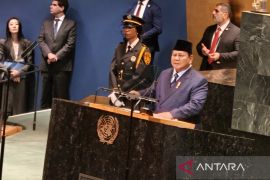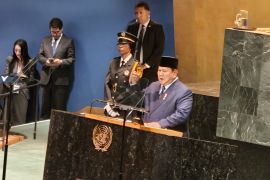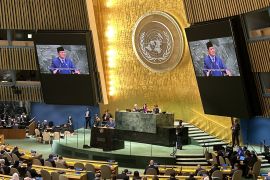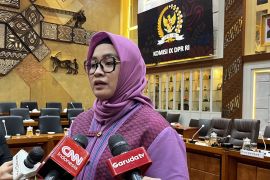"Supply is low while demand is high. This condition is prone to speculation," Natsir Mansur, deputy chairman of the Indonesian Chamber of Commerce and Industry (Kadin) for regional empowerment and logistics affairs, said.Jakarta (ANTARA News) - The food polices applied by the government to meet national needs are speculative as shown by the fact that supply and demand remain imbalanced, causing prices to also remain high, a chamber official said.
"Supply is low while demand is high. This condition is prone to speculation," Natsir Mansur, deputy chairman of the Indonesian Chamber of Commerce and Industry (Kadin) for regional empowerment and logistics affairs, said in a press statement here on Monday.
He said the minister of trade and the minister of agriculture were still unable to handle the most basic problems of food such as production, distribution and trade.
"The ministers have already known the basic problems that always come every year such the problem of sugar, beef, chicken, garlic, soy, chilli, horticultural products, yet they still issue speculative polices as indicated in the prices which still remain high and food commodity supplies which remain low," said Natsir.
The Kadin deputy chairman said that the two ministers still did not understand the importance of a food policy of a nation. He said that the logistics management in this country did not take side with the people so that their polices were still chaos.
Natsir said that Commission VI of the House of Representatives (DPR) actually had a strategic role in national food policy. But the role is helpless because the DPR control over the supply and demand for food is very weak. The DPR does not either use its budgetary right.
"The DPR should have taken sanctions against the two ministries by reducing their budget because they are not able to control food production, distribution and trade that cause the people to suffer from the shortage of supplies and high prices," said Natsir.
Ahead, the regional governments should be given the authority to issue food policies because they know their own respective needs for food. The food matters are handled too much by the two ministries, he said
In the meantime, the People`s Coalition for Food Sovereignty (KRKP) has recently urged the government to reduce the import of horticultural products for the sake of protecting the farmers.
KRKP Advocacy and Networking Officer Said Abdullah said on Tuesday (July 2) that the government has opened the door to imports 13 horticultural products after the rise of subsidized fuel prices.
He said the government has issued the import approval letter for the second semester in 2013 to import 13 horticultural products of 260,064 tons in an effort to maintain price stability and reduce the impact of fuel oil price hike.
Therefore Abdullah urged the government to be serious in handling the horticultural products and reducing the import.
He added that the government should support and motivate the farmers to continue to increase horticultural products and to gradually reduce the import.
Indonesia`s horticultural imports reached 1.5 million tons with a total value of US$1.2 billion in 2010 and in 2011 it increased to 2.05 million tons with a value of US$1.6 billion.
Then in 2012 it rose again to 2.2 million tons with import values of US$1.8 billion.
Abdullah said that the increase in horticultural imports has caused negative in the government trade balance.(*)
Editor: Heru Purwanto
Copyright © ANTARA 2013










